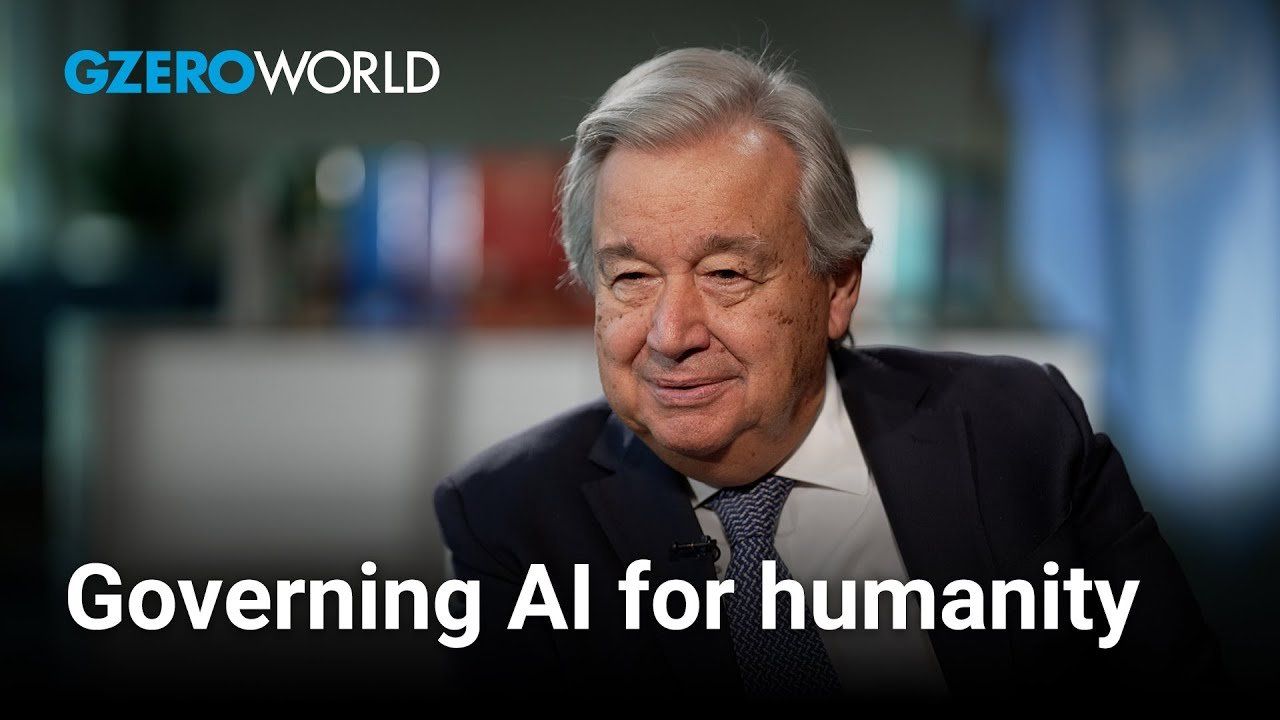September 18, 2024
Artificial intelligence has the power to transform our world, but it’s also an existential threat. There's been a patchwork of efforts to regulate AI, but they’ve been concentrated in wealthy countries, while those in the Global South, who stand to benefit most from AI’s potential, have been left out. Can the United Nations come together at this year’s General Assembly to agree on standards for a safe, equitable, and inclusive AI future?
Tomorrow, the UN’s High Level Advisory Body on AI will release a report called “Governing AI for Humanity,” with recommendations for global AI governance that will be a roadmap for safeguarding our digital future and making sure AI will truly benefit everyone in the world. Ian Bremmer is one of the 39 experts on the AI Advisory Body, and he sat down with UN Secretary-General António Guterres for an exclusive GZERO World interview on the sidelines of the General Assembly to discuss the report and why Guterres believes the UN is the only organization capable of creating a truly global, inclusive framework for AI.
“The United Nations has one important characteristic: its legitimacy. It's a platform where everybody can be together,” Guterres says, “Others have the power, others have the money, but not the legitimacy or the convening power the UN has.”
The exclusive conversation begins airing nationally on GZERO World with Ian Bremmer on public television this Friday, Sept. 20. Everything you need to know about Advisory Body’s final report will be dissected and analyzed in the GZERO Daily, landing in inboxes tomorrow (Sept. 19) at 7 am. Sign up here.
GZERO World with Ian Bremmer, the award-winning weekly global affairs series, airs nationwide on US public television stations (check local listings).
New digital episodes of GZERO World are released every Monday on YouTube. Don''t miss an episode: subscribe to GZERO's YouTube channel and turn on notifications (🔔).
From Your Site Articles
- Peace in Ukraine is world's priority, says UN chief António Guterres ›
- The White House sees AI clash with climate goals ›
- Yuval Noah Harari: AI is a “social weapon of mass destruction” to humanity ›
- How is AI shaping culture in the art world? ›
- Ian Explains: Why is the UN's Summit of the Future so important? - GZERO Media ›
- Can we use AI to secure the world's digital future? - GZERO Media ›
- UN Secretary-General António Guterres on AI, Security Council reform, and global conflicts - GZERO Media ›
- Why António Guterres believes the UN should lead on AI: Exclusive interview - GZERO Media ›
- Join Global Stage live from the 80th UN General Assembly - GZERO Media ›
- The UN at 80: Can multilateralism survive AI, war, and fragmentation? - GZERO Media ›
More For You
A photograph posted by U.S. President Donald Trump on his Truth Social account shows him sitting next to CIA Director John Ratcliffe as they watch the U.S. military operation in Venezuela from Trump's Mar a Lago resort, in Palm Beach, Florida, U.S., January 3, 2026.
@realDonaldTrump/Handout via REUTERS
Most Popular
- YouTube
In this "ask ian," Ian Bremmer analyzes Trump’s recent meeting with Zelensky and how close (or far) Russia and Ukraine are from a peace deal.
Syrian President Ahmed al-Sharaa attends the military parade of the Syrian army in Umayyad Square in central Damascus to mark the one-year anniversary of the fall of the Assad regime, on Dec. 8, 2025.
Mohammed Al-Rifai/dpa via Reuters Connect
A year ago this month, Syria’s brutal dictatorship collapsed. There are signs of recovery, but sectarian violence threatens to undermine the optimism.
© 2025 GZERO Media. All Rights Reserved | A Eurasia Group media company.
